英语交际口语热门话题:走神
- 格式:docx
- 大小:7.06 MB
- 文档页数:3
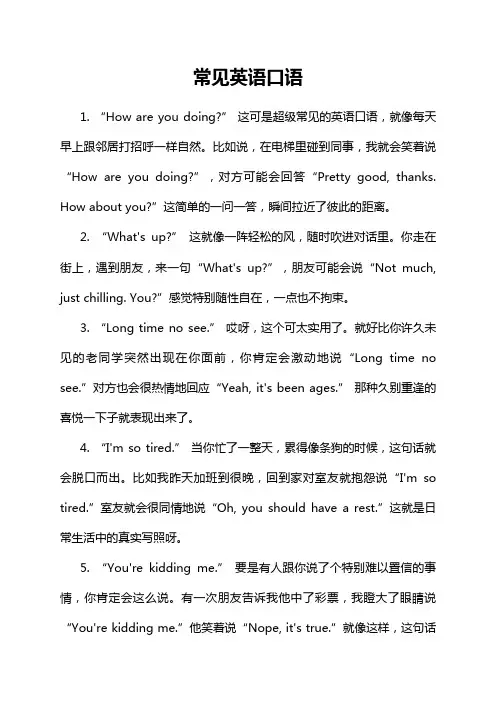
常见英语口语1. “How are you doing?” 这可是超级常见的英语口语,就像每天早上跟邻居打招呼一样自然。
比如说,在电梯里碰到同事,我就会笑着说“How are you doing?”,对方可能会回答“Pretty good, thanks. How about you?”这简单的一问一答,瞬间拉近了彼此的距离。
2. “What's up?” 这就像一阵轻松的风,随时吹进对话里。
你走在街上,遇到朋友,来一句“What's up?”,朋友可能会说“Not much, just chillin g. You?”感觉特别随性自在,一点也不拘束。
3. “Long time no see.” 哎呀,这个可太实用了。
就好比你许久未见的老同学突然出现在你面前,你肯定会激动地说“Long time no see.”对方也会很热情地回应“Yeah, it's been ages.” 那种久别重逢的喜悦一下子就表现出来了。
4. “I'm so tired.” 当你忙了一整天,累得像条狗的时候,这句话就会脱口而出。
比如我昨天加班到很晚,回到家对室友就抱怨说“I'm so tired.”室友就会很同情地说“Oh,you should have a rest.”这就是日常生活中的真实写照呀。
5. “You're kidding me.” 要是有人跟你说了个特别难以置信的事情,你肯定会这么说。
有一次朋友告诉我他中了彩票,我瞪大了眼睛说“You're kidding me.”他笑着说“Nope, it's true.”就像这样,这句话能很好地表达出你的惊讶。
6. “It's a piece of cake.” 形容事情简单的时候,这个短语超级好用。
我在教弟弟做数学题,他觉得很难,我看了一眼说“It's a piece of cake.”然后轻松地给他讲解了步骤,他马上就懂了,就像把一块小蛋糕轻松送入口中那么简单。
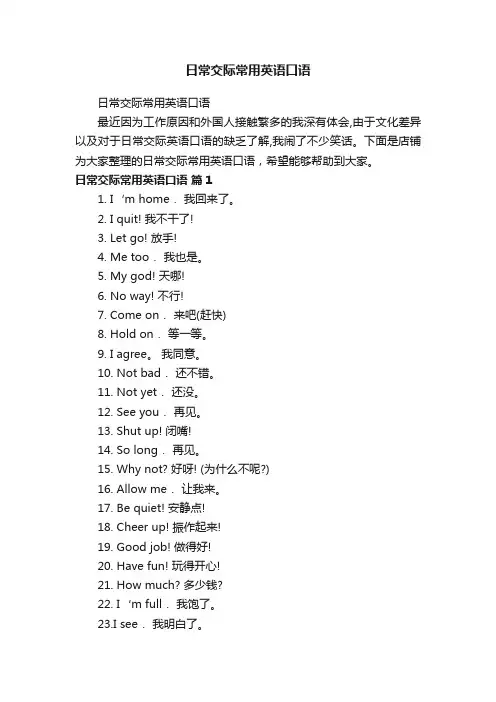
日常交际常用英语口语日常交际常用英语口语最近因为工作原因和外国人接触繁多的我深有体会,由于文化差异以及对于日常交际英语口语的缺乏了解,我闹了不少笑话。
下面是店铺为大家整理的日常交际常用英语口语,希望能够帮助到大家。
日常交际常用英语口语篇11. I‘m home.我回来了。
2. I quit! 我不干了!3. Let go! 放手!4. Me too.我也是。
5. My god! 天哪!6. No way! 不行!7. Come on.来吧(赶快)8. Hold on.等一等。
9. I agree。
我同意。
10. Not bad.还不错。
11. Not yet.还没。
12. See you.再见。
13. Shut up! 闭嘴!14. So long.再见。
15. Why not? 好呀! (为什么不呢?)16. Allow me.让我来。
17. Be quiet! 安静点!18. Cheer up! 振作起来!19. Good job! 做得好!20. Have fun! 玩得开心!21. How much? 多少钱?22. I‘m full.我饱了。
23.I see.我明白了。
24. I‘m lost.我迷路了。
25. My treat.我请客。
26. So do I.我也一样。
27. This way。
这边请。
28. After you.您先。
29. Bless you! 祝福你!30. Follow me.跟我来。
31. Forget it! 休想! (算了!)32. Good luck! 祝好运!33. I decline! 我拒绝!34. I promise.我保证。
35. Of course! 当然了!36. Slow down! 慢点!37. Take care! 保重!38. They hurt. (伤口)疼。
39. Try again.再试试。
40. Watch out! 当心。
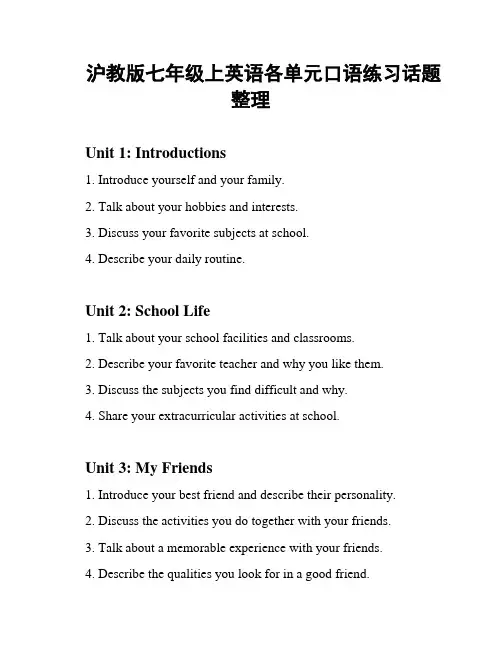
沪教版七年级上英语各单元口语练习话题整理Unit 1: Introductions1. Introduce yourself and your family.2. Talk about your hobbies and interests.3. Discuss your favorite subjects at school.4. Describe your daily routine.Unit 2: School Life1. Talk about your school facilities and classrooms.2. Describe your favorite teacher and why you like them.3. Discuss the subjects you find difficult and why.4. Share your extracurricular activities at school.Unit 3: My Friends1. Introduce your best friend and describe their personality.2. Discuss the activities you do together with your friends.3. Talk about a memorable experience with your friends.4. Describe the qualities you look for in a good friend.Unit 4: Daily Life1. Describe your morning routine before going to school.2. Discuss your favorite meal of the day and what you usually eat.3. Talk about your responsibilities at home.4. Share your favorite leisure activities and how often you do them.Unit 5: Leisure Time1. Talk about your favorite sports and why you enjoy them.2. Discuss your hobbies and how you spend your free time.3. Describe a recent movie or TV show you watched and your opinion on it.Unit 6: My City1. Describe your city's landmarks and attractions.2. Discuss the transportation options available in your city.3. Talk about the climate and weather patterns in your city.4. Share your favorite places to visit in your city and why.Unit 7: Celebrations1. Talk about your favorite festival or celebration.2. Describe the traditional food or customs during the celebration.3. Discuss the activities and events you usually do during the celebration.4. Share your most memorable celebration experience.Unit 8: Travel1. Talk about your dream travel destination and why you want to go there.2. Discuss the transportation options for traveling to different places.3. Share your most memorable travel experience and what you enjoyed.4. Describe the travel preparations you need to make before a trip.以上是沪教版七年级上英语各单元口语练话题的整理,希望对你的研究有帮助!。
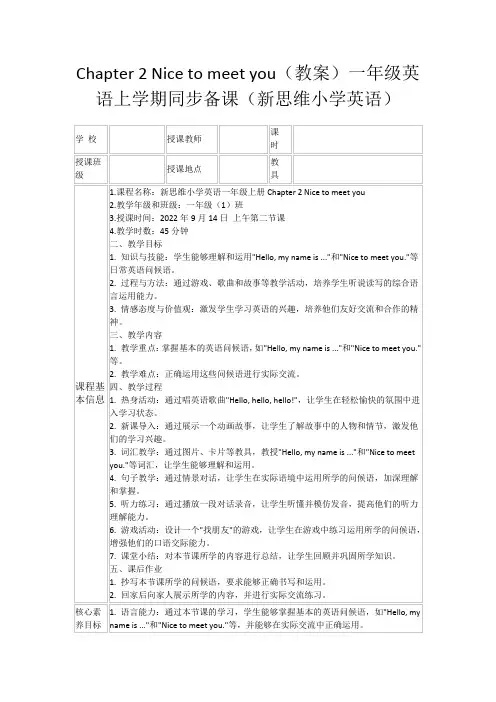
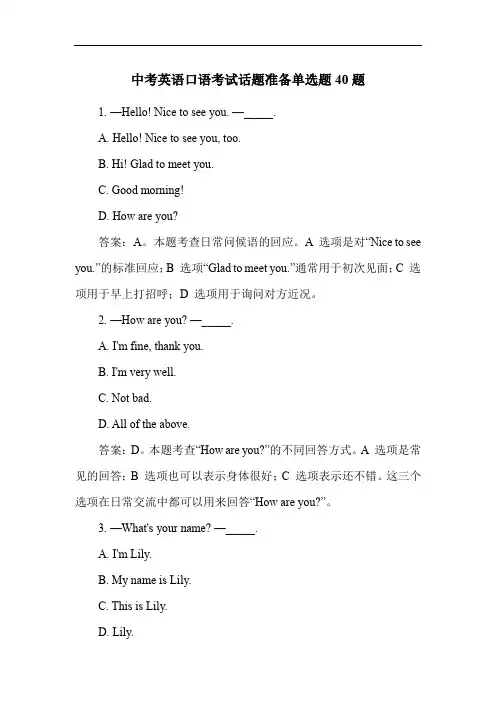
中考英语口语考试话题准备单选题40题1. —Hello! Nice to see you. —_____.A. Hello! Nice to see you, too.B. Hi! Glad to meet you.C. Good morning!D. How are you?答案:A。
本题考查日常问候语的回应。
A 选项是对“Nice to see you.”的标准回应;B 选项“Glad to meet you.”通常用于初次见面;C 选项用于早上打招呼;D 选项用于询问对方近况。
2. —How are you? —_____.A. I'm fine, thank you.B. I'm very well.C. Not bad.D. All of the above.答案:D。
本题考查“How are you?”的不同回答方式。
A 选项是常见的回答;B 选项也可以表示身体很好;C 选项表示还不错。
这三个选项在日常交流中都可以用来回答“How are you?”。
3. —What's your name? —_____.A. I'm Lily.B. My name is Lily.C. This is Lily.D. Lily.答案:D。
本题考查介绍自己名字的不同表达方式。
A 选项“I'm Lily.”完整地表达了“我是莉莉”;B 选项“My name is Lily.”也很常用;C 选项“This is Lily.”通常用于介绍别人;D 选项直接回答名字,比较简洁。
4. —Good morning! —_____.A. Good morning!B. Good afternoon!C. Good evening!D. Hello!答案:A。
本题考查早上打招呼的回应。
A 选项是对“Good morning!”的正确回应;B 选项用于下午打招呼;C 选项用于晚上打招呼;D 选项可用于任何时候打招呼,但不是对“Good morning!”的特定回应。
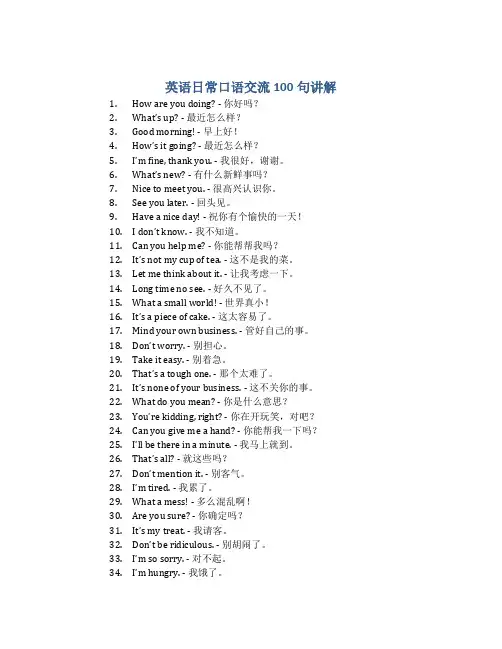
英语日常口语交流100句讲解1.How are you doing? - 你好吗?2.What’s up? - 最近怎么样?3.Good morning! - 早上好!4.How’s it going? - 最近怎么样?5.I’m fine, thank you. - 我很好,谢谢。
6.What’s new? - 有什么新鲜事吗?7.Nice to meet you. - 很高兴认识你。
8.See you later. - 回头见。
9.Have a nice day! - 祝你有个愉快的一天!10.I don’t know. - 我不知道。
11.Can you help me? - 你能帮帮我吗?12.It’s not my cup of tea. - 这不是我的菜。
13.Let me think about it. - 让我考虑一下。
14.Long time no see. - 好久不见了。
15.What a small world! - 世界真小!16.It’s a piece of cake. - 这太容易了。
17.Mind your own business. - 管好自己的事。
18.Don’t worry. - 别担心。
19.Take it easy. - 别着急。
20.That’s a tough one. - 那个太难了。
21.It’s none of your business. - 这不关你的事。
22.What do you mean? - 你是什么意思?23.You’re kidding, right? - 你在开玩笑,对吧?24.Can you give me a hand? - 你能帮我一下吗?25.I’ll be there in a minute. - 我马上就到。
26.That’s all? - 就这些吗?27.Don’t mention it. - 别客气。
28.I’m tired. - 我累了。
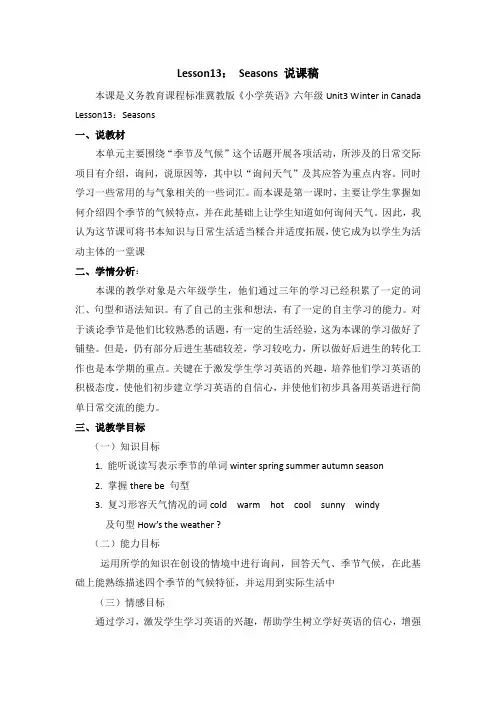
Lesson13:Seasons 说课稿本课是义务教育课程标准冀教版《小学英语》六年级Unit3 Winter in Canada Lesson13:Seasons一、说教材本单元主要围绕“季节及气候”这个话题开展各项活动,所涉及的日常交际项目有介绍,询问,说原因等,其中以“询问天气”及其应答为重点内容。
同时学习一些常用的与气象相关的一些词汇。
而本课是第一课时,主要让学生掌握如何介绍四个季节的气候特点,并在此基础上让学生知道如何询问天气。
因此,我认为这节课可将书本知识与日常生活适当糅合并适度拓展,使它成为以学生为活动主体的一堂课二、学情分析:本课的教学对象是六年级学生,他们通过三年的学习已经积累了一定的词汇、句型和语法知识。
有了自己的主张和想法,有了一定的自主学习的能力。
对于谈论季节是他们比较熟悉的话题,有一定的生活经验,这为本课的学习做好了铺垫。
但是,仍有部分后进生基础较差,学习较吃力,所以做好后进生的转化工作也是本学期的重点。
关键在于激发学生学习英语的兴趣,培养他们学习英语的积极态度,使他们初步建立学习英语的自信心,并使他们初步具备用英语进行简单日常交流的能力。
三、说教学目标(一)知识目标1. 能听说读写表示季节的单词winter spring summer autumn season2. 掌握there be 句型3. 复习形容天气情况的词cold warm hot cool sunny windy及句型How’s the weather ?(二)能力目标运用所学的知识在创设的情境中进行询问,回答天气、季节气候,在此基础上能熟练描述四个季节的气候特征,并运用到实际生活中(三)情感目标通过学习,激发学生学习英语的兴趣,帮助学生树立学好英语的信心,增强学生的参与意识,引导学生积极与他人合作,共同完成学习任务,也让学生学会热爱生活,学会发现生活中的美。
四、说教学重点:1、掌握四会单词spring, summer, autumn, winter, season2,、能用所学单词和句型介绍不同季节的气候特征。
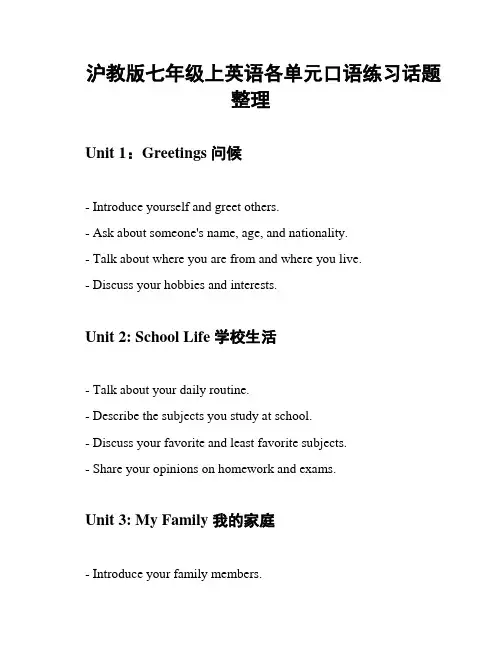
沪教版七年级上英语各单元口语练习话题整理Unit 1:Greetings 问候- Introduce yourself and greet others.- Ask about someone's name, age, and nationality.- Talk about where you are from and where you live.- Discuss your hobbies and interests.Unit 2: School Life 学校生活- Talk about your daily routine.- Describe the subjects you study at school.- Discuss your favorite and least favorite subjects.- Share your opinions on homework and exams.Unit 3: My Family 我的家庭- Introduce your family members.- Describe their physical appearances and personalities.- Talk about your relationships with your family members.- Share your favorite family activities and traditions.Unit 4: My Friends 我的朋友- Describe your best friend.- Talk about your friends' hobbies and interests.- Describe a fun activity you did with your friends.- Discuss the qualities you look for in a friend.Unit 5: Food and Drinks 食物和饮料- Talk about your favorite foods and drinks.- Describe a typical meal in your country.- Discuss healthy and unhealthy food choices.- Share your opinions on different cuisines.Unit 6: Hobbies and Leisure Time 爱好和闲暇时间- Talk about your hobbies and interests.- Describe a favorite activity you do in your free time.- Discuss the benefits of your hobbies.- Share your opinions on watching TV and using technology. Unit 7: Shopping 购物- Talk about your favorite places to shop.- Describe a recent shopping experience.- Discuss your preferences for online or offline shopping.- Share your opinions on different types of stores.Unit 8: Daily Routines 日常生活- Talk about your morning and evening routines.- Describe the activities you do after school.- Discuss your plans for the weekend.- Share your opinions on how to have a productive day. Unit 9: Travel 旅行- Talk about your dream travel destinations.- Describe a memorable trip you took.- Discuss your preferences for traveling alone or with others. - Share your opinions on the benefits of traveling.Unit 10: Festivals and Celebrations 节日和庆典- Talk about your favorite festival.- Describe how you celebrate holidays with your family.- Discuss the importance of traditions during festivals.- Share your opinions on the significance of celebrations.以上是沪教版七年级上英语各单元口语练习话题整理。
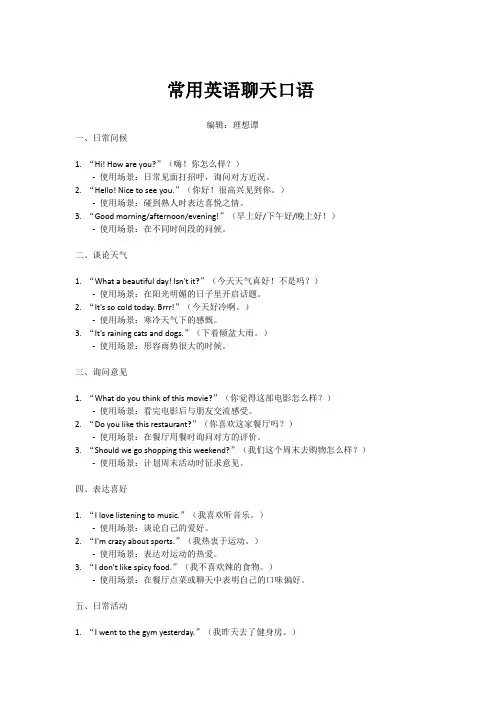
常用英语聊天口语编辑:理想谭一、日常问候1. “Hi! How are you?”(嗨!你怎么样?)- 使用场景:日常见面打招呼,询问对方近况。
2. “Hello! Nice to see you.”(你好!很高兴见到你。
)- 使用场景:碰到熟人时表达喜悦之情。
3. “Good morning/afternoon/evening!”(早上好/下午好/晚上好!)- 使用场景:在不同时间段的问候。
二、谈论天气1. “What a beautiful day! Isn't it?”(今天天气真好!不是吗?)- 使用场景:在阳光明媚的日子里开启话题。
2. “It's so cold today. Brrr!”(今天好冷啊。
)- 使用场景:寒冷天气下的感慨。
3. “It's raining cats and dogs.”(下着倾盆大雨。
)- 使用场景:形容雨势很大的时候。
三、询问意见1. “What do you think of this movie?”(你觉得这部电影怎么样?)- 使用场景:看完电影后与朋友交流感受。
2. “Do you like this restaurant?”(你喜欢这家餐厅吗?)- 使用场景:在餐厅用餐时询问对方的评价。
3. “Should we go shopping this weekend?”(我们这个周末去购物怎么样?)- 使用场景:计划周末活动时征求意见。
四、表达喜好1. “I love listening to music.”(我喜欢听音乐。
)- 使用场景:谈论自己的爱好。
2. “I'm crazy about sports.”(我热衷于运动。
)- 使用场景:表达对运动的热爱。
3. “I don't like spicy food.”(我不喜欢辣的食物。
)- 使用场景:在餐厅点菜或聊天中表明自己的口味偏好。
五、日常活动1. “I went to the gym yesterday.”(我昨天去了健身房。
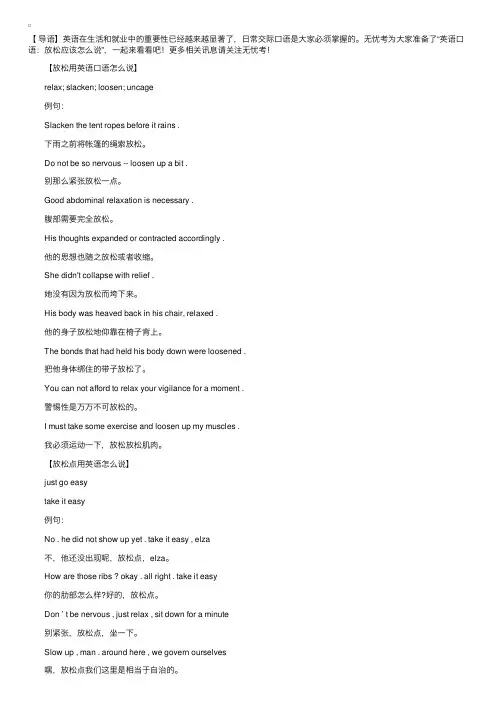
【导语】英语在⽣活和就业中的重要性已经越来越显著了,⽇常交际⼝语是⼤家必须掌握的。
⽆忧考为⼤家准备了“英语⼝语:放松应该怎么说”,⼀起来看看吧!更多相关讯息请关注⽆忧考! 【放松⽤英语⼝语怎么说】 relax; slacken; loosen; uncage 例句: Slacken the tent ropes before it rains . 下⾬之前将帐篷的绳索放松。
Do not be so nervous -- loosen up a bit . 别那么紧张放松⼀点。
Good abdominal relaxation is necessary . 腹部需要完全放松。
His thoughts expanded or contracted accordingly . 他的思想也随之放松或者收缩。
She didn't collapse with relief . 她没有因为放松⽽垮下来。
His body was heaved back in his chair, relaxed . 他的⾝⼦放松地仰靠在椅⼦背上。
The bonds that had held his body down were loosened . 把他⾝体绑住的带⼦放松了。
You can not afford to relax your vigilance for a moment . 警惕性是万万不可放松的。
I must take some exercise and loosen up my muscles . 我必须运动⼀下,放松放松肌⾁。
【放松点⽤英语怎么说】 just go easy take it easy 例句: No . he did not show up yet . take it easy , elza 不,他还没出现呢,放松点,elza。
How are those ribs ? okay . all right . take it easy 你的肋部怎么样?好的,放松点。
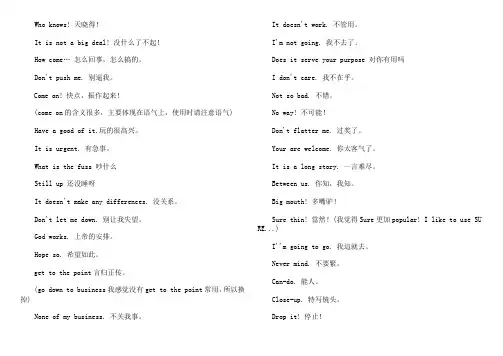
Who knows! 天晓得!It is not a big deal! 没什么了不起!How come… 怎么回事,怎么搞的。
Don't push me. 别逼我。
Come on! 快点,振作起来!(come on的含义很多,主要体现在语气上,使用时请注意语气)Have a good of it.玩的很高兴。
It is urgent. 有急事。
What is the fuss 吵什么Still up 还没睡呀It doesn't make any differences. 没关系。
Don't let me down. 别让我失望。
God works. 上帝的安排。
Hope so. 希望如此。
get to the point言归正传。
(go down to business我感觉没有get to the point常用,所以换掉)None of my business. 不关我事。
It doesn't work. 不管用。
I'm not going. 我不去了。
Does it serve your purpose 对你有用吗I don't care. 我不在乎。
Not so bad. 不错。
No way! 不可能!Don't flatter me. 过奖了。
Your are welcome. 你太客气了。
It is a long story. 一言难尽。
Between us. 你知,我知。
Big mouth! 多嘴驴!Sure thin! 當然!(我觉得Sure更加popular! I like to use SU RE...)I''m going to go. 我這就去。
Never mind. 不要緊。
Can-do. 能人。
Close-up. 特写镜头。
Drop it! 停止!Bottle it! 闭嘴!(Shut up用的更多)Don''t play possum! 別裝蒜!There is nobody by that name working here.這裡沒有這個人。
英语口语速递---不在状态用英语该如何表达I'mnot myself today. 我今天不在状态。
I'm not myself 字面上表示我不是我自己了。
其实是在说我今天很不在状态,心神不宁,心情不佳,做事有些迟钝或反常。
口语中非常常用。
例句:I'm not myself today after so many drinks!Let's talk tomorrow.我今天喝多了不在状态, 明天谈吧.I just zoned out for a moment.我刚才走神了。
zone out 表示人的状态迷迷糊糊,浑然无觉,头昏脑涨。
偶尔一阵走了神,上课开小差,都可以这样说。
例句:After working six hours straight, I zonedout in front of my computer screen.连续工作六小时之后,我在电脑屏幕前头脑一片空白。
My brain isn't functioning.我脑子不好使了。
function表示功能,也可以作为动词表示发挥功能。
mybrain isn't functioning 很形象很直接的表示,我的脑子不工作了,俗话也说“脑子不好坏掉了”例句:Somehow my brain isn't functioning today.不知怎么的,我今天脑子不太好使。
I was messed up.我很混乱(把事情搞砸了)。
mess up 就是把事情弄混乱,或搞砸的意思。
我们经常说messsomething up。
如果直接说一个人be messed up,可以表示这个人状态不好,处于浑浑噩噩,混乱不堪的状态。
英语口语中常用口头禅英语是世界上最广泛使用的语言之一,而其中的口语也有一些常见的口头禅,这些短语经常在日常交流和对话中出现。
本文将介绍一些英语口语中常用的口头禅,希望能帮助读者更好地理解和运用。
1. "You know"(你知道的)这是一种常见的口头禅,用于加强或强调对话中的某个观点或信息。
它可能表示对方确实已经知道这件事情,或者仅仅是作为对话的填充词语。
例如:“You know, I've been really busy at work lately, so I haven't had much free time.”2. "I mean"(我的意思是)这个短语经常被用来解释并更清楚地表达自己的观点或意见。
当一个人需要进一步说明或解释他们要说的话时,会使用这个口头禅。
例如:“That movie was so boring, I mean, I couldn't even stay awake until the end.”3. "Basically"(基本上)这个词通常用于概括或总结一个观点或观念。
它可以用来简化或概括一类事物,以便更好地理解。
例如:“Basically, what I'm trying to say is that we need to work together in order to succeed.”4. "I guess"(我猜)这个短语常常用来表达犹豫或不确定的态度。
它表示说话人对自己的观点或预测没有完全的把握。
例如:“I guess we'll have to wait and see what happens.”5. "You see"(你看)这是一种常用的口头禅,用于引起对方的注意或解释对话中的某个观点。
它可以用来解释复杂的问题或提供更多的背景信息。
写自己上课时走神的作文英文回答:Sometimes, during my classes, I find myself driftingoff into my own thoughts. It's like my mind takes a little vacation from the lesson and starts wandering in different directions. One moment, I'm listening to my teacher explaining a math problem, and the next moment, I'm daydreaming about what I'm going to have for lunch. It's a constant battle between staying focused and letting my mind wander.One of the main reasons why I get distracted in class is because I find certain subjects boring. For example, when my history teacher starts talking about ancient civilizations, my mind automatically switches off. I just can't seem to find any interest in learning about people who lived thousands of years ago. Instead, I start thinking about more exciting things, like the latest video game I want to play or the upcoming movie I want to watch.Another reason for my wandering thoughts in class is that sometimes I'm overwhelmed with information. When my science teacher bombards us with complex formulas and theories, my brain goes into overload mode. It's liketrying to understand a foreign language that I've never heard before. In those moments, I find it difficult to concentrate, and my mind starts to drift away to simpler and more familiar thoughts.Furthermore, distractions in the classroom also contribute to my lack of focus. Whether it's a classmate whispering to me, a bird flying outside the window, or even the sound of rain hitting the roof, my attention easily gets diverted. These external distractions pull me away from the lesson at hand and make it even harder for me to stay engaged in class.Despite my tendency to daydream, I do recognize the importance of paying attention in class. It's crucial for my learning and academic success. When I'm able to stay focused, I absorb the information better and can activelyparticipate in class discussions. Plus, I don't miss out on any important details that may be crucial for exams or assignments.中文回答:有时候,在上课的时候,我发现自己会走神。
80704 学科教育论文浅谈英语教学中的输入与输出改革开放带加快了中国融入世界这个大家庭,因此,作为国际语言的英语,也受到了社会各界的关注,对外语人才的需求也不断增长,也对我国的英语教育提出了更高的要求。
不知识面要广、更重要的是英语的思维以及心理健康,强调了英语学习的综合素养。
新课程主张自主、合作、探究的学习方法,倡导学生为主体,教师为主导。
如何确保英语教学的有效性,培养学生在听说读写方面的综合素质,我们应该关注教学过程中对于学生的输入以及学生自身的输出。
一、英语综合能力英语语言学习要求学生掌握听、说、写、读这四种基本技能,听与读是属于语言输人,语言习得建立在足够量的输人基础之上,听与读作为领会式技能是获得语言知识的重要渠道,也是写与说的前提。
(一)听力英语学习的过程中,听力学习方面存在不少问题。
有些被问到频率很高的问题,比如:听材料时经常走神,注意力不集中。
考试过程中听力讲求的是听的技巧,如果你听到的总是“一些无意义的内容”,则是无效听力,没有听到材料的重点,当然会走神。
对于听力材料,平时应听些什么材料?其实,听力能力的养成重在坚持,材料可以广泛,例如歌曲、演讲、电影。
但是,一定要反复听,加强语言材料的输入。
(二)口语听力和口语的学习相互影响,大多数的口语活动会有大于等于两个人进行交流和信息互换。
口语的过程就是当讲话者表达自己的想法和意见,听话者确保在听懂的情况下对与讲话者表达的内容进行深加工,从而进行回答。
所以说听力水平的好坏会直接影响口语交际。
口语是在较强的听力理解能力的基础上形成,扎实的口语能力可以分成以下三个方面:基础语言知识(包括语音、语法及词汇知识,扎实的语法和大量的词汇是提高英语综合能力的基础);常规语言知识(包括功能句型,如口语交际中常用或者典型的口头用语,同时涉及各种功能表达,应变技能是指在交际过程中遇到问题能随机应变地解决并完成沟通能力。
)(三)阅读阅读对于学生来说是一个坎,阅读理解不仅需要语言敏感性,主体意识和跳读略读等不同的阅读技巧能力。
七年级上册英语口语、句子、短文集锦一、疯狂的口语(二十天如痴如醉烂熟上册英语口语!)1、互相打招呼:(1)--Goodmorning/afternoon/evening.--Good morning/afternoon/evening.(2)--How do you do--How do you do(3)--Nice to meet you!--Nice to meet you!(4)--Hello!--Hello!--Hi!--Hi!2、问候与回答:--How are you--(I’m) fine,thanks.And you--I’m OK./Just so-so.3、询问与回答物品:(1)--What’s this (in English)--It’s an orange.--Spell it,please.--O-R-A-N-G-E,orange.(2)--what’s that --It’s a quilt.--Can you spell it--Yes,Q-U-I-L-T, quilt.(3)--Is this a pen--Yes, it is.--Is that a ruler--No,it isn’t. It is a book.. (4)--What are these--They are pencils.(5)--what are those--they’re cups and rulers.(6)--Are these/those/they jackets--No,they’re shirts.4、询问与回答物品颜色:(1)--What color is this/that/the pen--It’s red. It’s a red pen. (2)--What color are these/those/the jackets--they are black and white.(3)--Is this/that coat blue--No,it isn’t. It is brown. It is a brown coat.(4)--Are these/those coats green--They’re orange. They are orange coats5、询问与回答姓名:(1)--What’s your name--My name is Alan./I’m Alan./Alan.(2)--Are you Dale--Yes, I am./No,(I’m Not.) I’m Alan.(3)--What’s her name--Her name is Cindy./She is Cindy./Cindy.(4)--What’s his name--His name is Jack./He is Jack../Jack.(5)--Is she Mary--No,(she isn’t.)She is Alice. (6)--Is he Bob--yes,he is.6、询问与回答号码:(1)--What’s your telephone number--(My telephone number.is) .(2)--What’s her telephone number--Her telephone number is .(3)--What’s Tony’s telephone number--His telephone number is .7、询问与介绍人物:(1)--This is my friend Jane.Jane,this is my sister cindy. (2).--This is my brother Dale,and that’s my mother Nancy. (3)--These are my brothers Dale and Jack..Those are my parents.(4)--Who’s she--She’s my sister (Lucy).--Who’re they--They’re my grandaparents.8、询问物品地方与回答:(1)--Where’s my schoolbag--It’s under the table.(2)--Where’re the books--They’re on the sofa.(3)--Is my computer game on the desk--No,it isn’t. It’s in Nancy’sschoolbag.--Are the keys on the table--I don’t know. Maybe they are on the floor.9、询问物品所属关系与回答:(1)--Is this your pencil--Yes,it’s my pencil./It’s mine.(2)--Is that his green pen--No,.It’s her pen./It’s hers.The blue pen is his.(3)--Are these your books--No,they aren’t.they’re Eric’s.(4)--Are those her keys--Yes,they are./No,they aren’t.they’re mine.10、询问某人是否有某物与回答:(1)--Do you have a baseball--Yes, I do./No,I don’t.I have a volleyball.(2)--Does she have a tennis ball--Yes,she does.--No,she doesn’t.She has a baseball.(3)--Does Dale have a soccer ball--Yes,he does.--No,he doesn’t. He has two ping-pong bat.(4)--Do they have a basketball--No,they don’t.They have a volleyball.11、询问与表达喜好:(1)--I like oranges.What do you like --I like apples.(2)--Do you like salad--Yes, I do./No, I don’t. I like Pears.(3)--Does she like tomatoes--Yes,she does./No,she doesn’t. (4)--Does your brother like ice-cream --No, he doesn’t.--What does he like--He likes fruit.But he doesn’t like pears.(5)--We don’t like hamburgers.We like rice and carrots.12、询问物品价格与回答:(1)--How much is the hat--It’s five dollars.--It looks nice.I’ll take it.--How much is that brown sweater--They’re eighty dollars.--It’s too dear.(2)--How much are these socks--They are two dollars.--OK,I’ll take one pair of socks.(3)--How much are the black trousers --They’re nine dollars.--Great!I’ll take two pairs.13、询问生日与回答:(1)--When is your birthday--My birthday is on May 2nd.(2)--When is Alice’s birthday--Her birthday is on September 5th.(3)--When is your father’s birthday --His birthday is on April 21st. (4)--Is your birthday in July--No,it isn’t.It’s in June.It’s on June 3rd.14、询问喜好与原因:(1)--What’s your favorite subject--My favorite subject is science. --Why do you like it--Because it’s intereting.(2)--What’re Frank’s favorirte subjects--His favorite subjects are art and history.--Why does he like them--Because they are fun.(3)--Does Bob like maths--No,he doesn’t.--Why doesn’t he like it--Because he thinks it’s boring.二、疯狂的句子(二十天似癜似狂嚼碎上册句子)1.--How’s it going—Everything is OK.2.--How are you doing—I’m OK.3.You must look after your things!4.This is an orange.The orange is orange.5.This is a black and white jacket.6.Tony and Bill are brothers.7.You,he and I are from China.8.Miss Li is our music teacher.She teaches us music.We all like her very much.9This is my friend.His last name is Brown,and his first name is Jack..His full name is Jack Brown.10.Seven and one is eight.11.His name is Bill.He is one of my good friends,too.12.Here are two nice photos of my family.Here goes the bell.13.Thanks for your help.Thanks for the photo of your family.14.They live in a very big house in Shanghai.Tey are a big family.15.I live in sichuan.My uncle lives in Beijing.My aunt deoesn’t live in Beijing,she lives in Chongqing.16.These books aren’t mine.They are theirs.17.This is Lucy and Lily’s bedroom.The twin sisters like it very much.18.They are Jack’s and Tony’s mothers.They like playing baseball.19.His little brother often asks his parents for junk food.20.I must find/look after my little sister.21.Please call me at .22.I’m tidy,but Gina is not.I like vegetables, but he doesn’t.23. We have nothing to do but wait. He has nothing to do but watch TV.24.I always clean the house once a week.But Nancy always cleans her house twice a week.25.My schoolbag is under the desk.On the sofa is my computer game. There is a pencil box on the floor.26.Open the door,please.Don’t close the window,please. 27.He needs a cup of tea,he doesn’t need a glass of water.28.--Let’s play soccer!--That sounds great./That’s a good idea./It’s boring.29.It’s kind of you to help me a lot.It’s easy for me to learn English well.30.There are a few carrots in the fridge,but there are few other vegetables in it.31.There is a little milk in the bottle,but there is little bread in the dish.32.--What do you have for breakfast--I often have bread and milk. But I had noodls for breakfast this morning.33.--What vegetable do you like--Broccoli.--what movies do you like--Action movies.34.This coat is too large for me,but that one is too small for me.35.Look at the flowers!They are in different colors.36.--What’s th price of the dictionary--It’s ten dollars.37.Our shop has clothes in all colors at a very good price.38.I can’t afford the car.39.I want to buy a bag for sports.But Lily wants to buy a pair of shoes for sports.Betty would like to buy a glass.40.Welcome to our party!I hope you all can have a good time here.41.--What’s your date of birth--October 1st.42.Friday is the sixth day of the week.September is the ninth month of the year.43.I’m very busy on Friday.I am busy doing some cleaning in the morning and busy with my homework in the afternoon..44.He has a toothache and can’t speak.45.English is difficult but interesting.46.Our teacher is very strict with us in English.三、疯狂的短文(爱上读英语,作文也简单)1.Grace在下午上学时遇到了王老师。
1. What are you up to 你正在做什么假设你在办公室想跟同事沟通下工作情况,又怕耽误对方的工作,就可以先问同事"In the middle of something"(你在忙吗)如果对方回答"Kind of."(算是吧。
)这时你就可以继续你的谈话了,比如可以做一下谈话前的“热身”,问对方:"Wh at are you up to"(你最近在忙什么啊),然后再展开你想沟通的话题。
另外美国人见面时常用的问候语"What’s up"就与"What are you up to"在意思方面很接近,都是问“你最近在做什么啊”但是需要注意一点:语气的不同所表达的意思也不相同,比如你发现在未经你允许的情况下,别人正在你的办公桌上乱翻,就可以过去责问他"What are you up to"(你正在搞什鬼)。
除此以外"W hat are you up to"还有其他意思,比如你的同事正在完成某个项目,你就可以说"What are you up to"(目前进展如何)当然"What are you up to"与"What ar e you doing"意思基本相同,可相互取代,但是多变的表达方式会令你在工作期间的交流中显得更加出彩。
2. In the middle of something 你正在忙吗在上面已经提到了In the middle of something (你正在忙吗)这句话,惯用的说法是"Are you busy",但是死啃一种说法显然过于单一化,把眼界放广一点,对于同一个概念要有不同的变化。
如果你经常用"Are you busy",不妨换成"In t he middle of something",因为这句话的意思更为准确,比较接近于"Are you b usy right now"(现在是不是正在忙)而"Are you busy"的含意不仅可以解释为“现在是不是正在忙”也可指“最近忙不忙”。
英语交际口语热门话题:走神
第一,迷你对话
A: Why are you always out in the field while listening to the news?
为什么你听新闻的时候不专心啊?
B:I am listening to the music and I couldn’t helpmoving my body.
我在听歌,就情不自禁地动了起来。
第二,地道表达
out in the left field
1. 解词释义
Out in the left field的字面意思是“外出到田野左边去”,比喻为“(做事)不专心”或“(说话)跑题”的意思。
2. 拓展范例
e.g. If we are out in the left field at work we'll make a mistake.
我们如果不专心工作,就会出差错。
e.g. He was a bad student because he is always out in the left field and never paid attention.
他是个坏学生,因为他总是偷懒,上课都不专心。
e.g. I think you are out in the field. Could we get back to the main point, please?
我觉得你跑题了。
我们能不能回到主题上来?
e.g. You're out in the field again, so please keep to the subject.
你又要离开正题了,请不要跑题。
第三,视野拓展
1. Out in the left field还能够表示“错得离谱”的意思。
例如:
Paul tried to answer the teacher's question ,but he was out in left field.
保罗努力回答老师的问题,但全错了。
Philip tried to guess what the surprise was but he was way out in left field.
菲利浦想猜出是什么惊喜,但他猜错了。
2. Out in the left field还能够表示“疯的,行为举止怪异荒诞的”。
例如:
I think your history professor is out in left field.
我感觉你们的历史教授有点不正常。
After her father was killed by a group of bandits, the girl was out in left field.
自她父亲被一群匪徒杀害后,那女孩就疯了。
第四,咬文嚼字
1. Could not help doing something/something表示情不自禁做某事。
例如:
She could not help her tears, and yielded to the overflow.她禁不住热泪盈眶,接着就听凭眼泪流了下来。
I could not help detecting a note of sadness in his voice.我不由自主地发现他说话时所流露出的那种忧伤情感。
2. listen to the news:听新闻move one’s body:身体晃动。